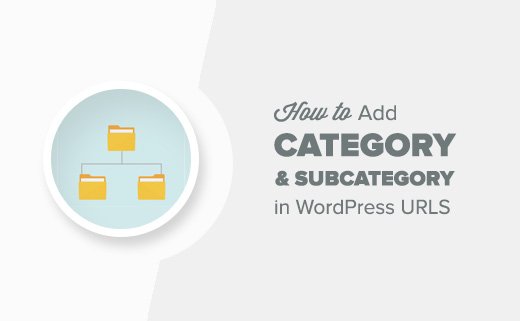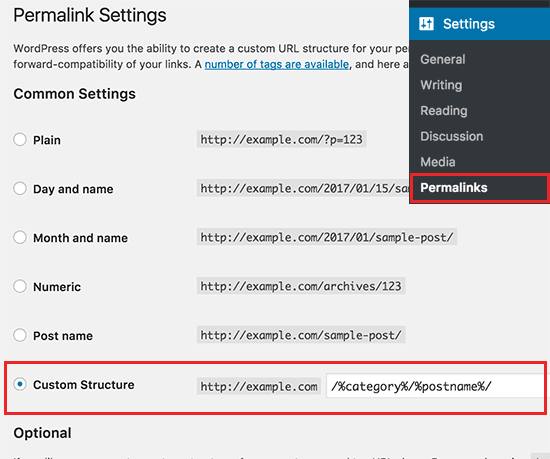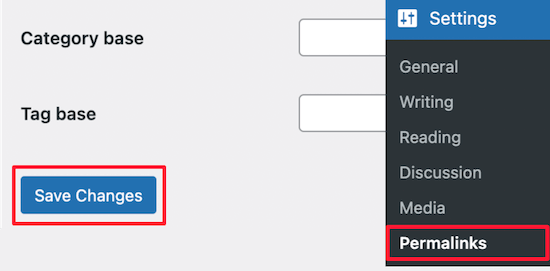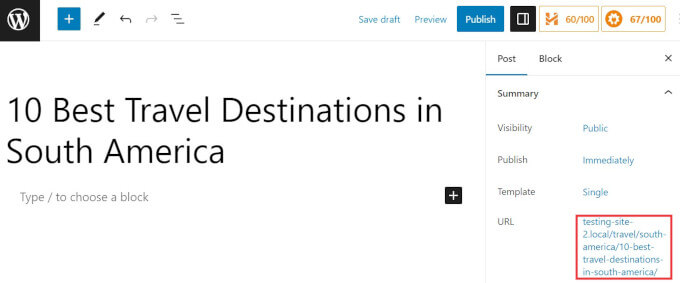Muitos guias de SEO do WordPress dizem que os permalinks simples são os melhores. Mas depois de trabalhar com muitos sites, descobrimos que isso nem sempre é verdade.
Às vezes, especialmente para sites grandes, é melhor ter URLs que mostrem onde você está, como “yourstore.com/electronics/smartphones/iphone”. Essa estrutura clara pode tornar seu site mais fácil de usar.
Se você é novo no WordPress, talvez esteja se perguntando como configurar esse tipo de estrutura de permalink para o seu site. Neste guia, mostraremos como adicionar categorias e subcategorias aos seus URLs. Abordaremos por que você pode querer isso, como fazer isso com segurança e o que deve ser observado.

Quando incluir a categoria e a subcategoria nos URLs do WordPress
Alguns sites do WordPress usam categorias e subcategorias em seus URLs quando têm muito conteúdo em seus sites e querem organizá-los melhor. Na WPBeginner, usamos essa estratégia para facilitar a navegação em nosso site para nossos leitores.
Por exemplo:
1 | https://www.wpbeginner.com/plugins/7-best-wordpress-backup-plugins-compared-pros-and-cons/ |
Para lojas on-line, a inclusão de categorias e subcategorias em URLs fornece uma dica visual sobre o conteúdo que os clientes estão prestes a acessar, o que pode melhorar a experiência do usuário.
Por exemplo, um URL como onlinestore.com/books/fiction/thriller indica que o usuário está navegando para uma subcategoria específica dentro de uma categoria mais ampla no site do WordPress.
A inclusão de categorias e subcategorias nos URLs também pode ajudar os mecanismos de pesquisa a entender a estrutura do seu site. O URL corresponderia à navegação de migalhas de pão em seu site e incluiria mais palavras-chave e texto, tornando seu site mais amigável para SEO.
Para obter mais informações sobre categorias, leia nossos guias sobre taxonomias do WordPress e categorias versus tags: práticas recomendadas de SEO para classificar seu conteúdo.
Se você estiver usando a estrutura de URL padrão do WordPress, suas categorias e subcategorias não serão incluídas nas URLs dos posts. Portanto, vamos ver como adicionar facilmente categorias e subcategorias nos URLs do WordPress.
Como adicionar facilmente categoria e subcategoria nos URLs de postagem do WordPress
Observação: não recomendamos alterar os permalinks quando seu site WordPress estiver no ar há algum tempo (ou seja, há mais de seis meses). Caso contrário, você poderá perder suas classificações nos mecanismos de pesquisa.
Se for necessário alterar a estrutura de permalink, sugerimos que você faça backup do site em caso de erros e crie redirecionamentos dos URLs antigos para os novos.
Primeiro, você precisa visitar a página Configurações ” Permalinks em seu painel de administração do WordPress. Lá, você precisa clicar na opção “Estrutura personalizada” na área Configurações comuns.

Em seguida, você precisa adicionar /%category%/%postname%/ no campo ao lado de Custom Structure (Estrutura personalizada).
Depois disso, não se esqueça de clicar no botão “Save Changes” (Salvar alterações) para armazenar suas configurações de estrutura de permalink personalizada.
Isso é tudo!

O WordPress agora começará a adicionar categorias e categorias secundárias nos URLs do WordPress. Você pode ver as configurações de permalink personalizado em ação criando um novo post ou editando um já existente.
Basta atribuir uma categoria (e subcategoria, se você as usar) a essa postagem na barra lateral e clicar no botão “Update” (Atualizar).

Você notará que o nome da categoria e o nome da subcategoria estão incluídos no permalink da postagem.
Qual seria a aparência do URL se eu usasse várias categorias ou subcategorias?
Vamos imaginar que você classifique as postagens do seu blog no WordPress em várias categorias ou subcategorias.
O WordPress incluirá apenas uma categoria e uma categoria secundária no URL. Se você não tiver escolhido uma subcategoria, ele mostrará apenas uma categoria principal.
O WordPress escolhe a categoria em ordem alfabética. Por exemplo, se você arquivar uma postagem usando as categorias “Apple” e “Tecnologia”, o WordPress incluirá “apple” no URL porque ela vem em primeiro lugar na ordem alfabética:
1 | http://example.com/apple/article-title-here/ |
Se você arquivar uma postagem em “Apple” e uma subcategoria abaixo dela chamada “Tecnologia”, ela incluirá ambas no URL:
1 | https://example.com/apple/technology/article-title-here/ |
Se você selecionou uma subcategoria, mas não selecionou especificamente uma categoria principal, o WordPress ainda incluirá a categoria principal no URL.
Outro cenário é quando você tem uma categoria principal, uma subcategoria e uma sub-subcategoria. O WordPress incluirá todas as três no permalink do WordPress:
1 | https://example.com/apple/technology/events/article-title-here/ |
Para obter mais informações sobre permalinks, consulte os seguintes guias do WordPress:
- Como remover números de URLs do WordPress
- Como remover a data dos URLs do WordPress
- Como alterar os Permalinks do tipo de postagem personalizada no WordPress
Esperamos que este artigo tenha ajudado você a aprender como incluir uma categoria e uma subcategoria nos URLs do WordPress. Talvez você também queira ver nosso artigo sobre como alterar o prefixo da base da categoria no WordPress e nosso guia para iniciantes sobre a criação de taxonomias personalizadas no WordPress.
Se você gostou deste artigo, inscreva-se em nosso canal do YouTube para receber tutoriais em vídeo sobre o WordPress. Você também pode nos encontrar no Twitter e no Facebook.





AB Juma
Hi there,
Thank you for this. Very helpful.
Just a question – I already have more than 2,000 posts on my website with the day and name url structure. If I change to custom, will those urls change too, or does the change only apply to new posts? Thanks.
WPBeginner Support
Yes, if you change your permalinks it would affect everything on your site. You would want to set up 301 redirects to prevent issues if you change the structure, our guide below should help with that!
https://www.wpbeginner.com/beginners-guide/beginners-guide-to-creating-redirects-in-wordpress/
Admin
Jay
it’s only putting the Parent cateogry in the slug.
How can i make it automatically put subcategory in the url as well?
WPBeginner Support
Please check that the post is only in the subcategory for the most likely reason for that issue.
Admin
Brendon
This seems to break any products that do not use a sub category at all.
WPBeginner Support
It should not cause you trouble with products that don’t have a sub category but if you mean you changed your permalinks then you would want to set up 301 redirects following our guide below:
https://www.wpbeginner.com/wp-tutorials/how-to-create-custom-permalinks-in-wordpress/#redirect-permalink
Admin
Taoheed
I would be glad if you answer this. Let’s assume i published a post into two/three categories or sub-categories, wouldn’t it be treated as duplicate content on google?
WPBeginner Support
It should not cause Google to see it as duplicate content but if you have posts that are in multiple categories then your users would see that same post when they viewed your other categories. We would normally recommend only one category for a post.
Admin
David
Please is there a way to include tags in the URL instead of categories?
WPBeginner Support
We do not have a recommended method for including tags in your URL at the moment, we would recommend taking a look at our article below that covers the organizational differences between the two for why categories are preferred over tags in permalinks:
wpbeginner.com/beginners-guide/categories-vs-tags-seo-best-practices-which-one-is-better/
Admin
Phu Nguyen
Hi,
Currently I have a url: abc.com/games/ff9/weapon-list/
and I can’t create another post with the same name (weapon-list) on another category.
It will be like abc.com/games/ffx/weapon-list-1/
Is there any solution for my case? Looking forward to your help
WPBeginner Support
The end of the URL would be determined by your post’s name and the other sections would be determined by your permalink structure. You cannot have the same name for the time being and would need a different name
Admin
Lori S.
So for pages, it would just skip over the /%category%/ and maintain the original post name?
WPBeginner Support
Yes
Admin
Ashish
Is it a disadvantage to using categories in URL? like example.com/plugin/best-plugin/. in this case plugin uses 2 times. is this URL looks spammy?
WPBeginner Support
You would want to try avoiding looking spammy with your choice of title but it is not a disadvantage to use categories n your URL.
Admin
jacques
Important note: To get URL structure like: /category/child1/child2/POSTNAME then ONLY select “child2” as the post category when editing the post. WordPress will automatically add all parent categories to the URL. Took me a while to figure that out.
WPBeginner Support
Thanks for sharing this for people looking for that permalink setup
Admin
Austin Epple
You’re the man. I’ve been tearing my hair out trying to get these stupid subcategories in the url. Thank you!
Smart
Thank you so much @jacques, you just helped me solve a challenge that has taking me so many hours without solution. Thanks mahn
Rubb
How this work with pages? pages don’t use categories
WPBeginner Support
As they do not have categories, they would not have the category in the URL
Admin
Ben
So how do i redirect from /%postname%/ to /%category%/%postname without the redirection plugin.
WPBeginner Support
For different methods to create redirects we would recommend taking a look at our guide below:
https://www.wpbeginner.com/beginners-guide/beginners-guide-to-creating-redirects-in-wordpress/
Admin
May
Is there a way to add hierarchy to parent categories? If a post has two categories how can I chose which category is used in the URL.
As you say in your article, default is alphabetical.
For example I have a post categorised “Fruit” and “Vegetable” with the permalink set to show /%category%/%postname%/.
The URL shows website.com/Fruit/postname but I want it to use website.com/vegetable/postname.
WPBeginner Support
In those situations, you may want to look into how your categories are organized to see if tags may be what you need more than categories for some organizations. Normally posts shouldn’t be in multiple categories.
Admin
Nik
How can I add category in my page url.
WPBeginner Support
By default, pages don’t have categories so they wouldn’t be included in the page options.
Admin
Mlimasolucoes
Use subcategory as primary category then URL will work
WPBeginner Support
Thank you for sharing that recommendation
Admin
Muhammad Kashif Rasheed
You answer is valuable for me, because I read all the post but not permalink not work fine on my side, when I applied your suggestion I got answer of my question.
Once again thankyou very much,
Sravankumar
I am unable to see subcategory in any posts.
I am facing issue while creating a post name. How can Icreate a URL like this: site/destinations/europe/norway/post-name
I have the page to create a URL like above is it only possible if I create a page or with post name also can we create?
site/destinations/europe/norway/
WPBeginner Support
If I’m understanding the question correctly, you don’t need to create a page at the second link’s location as that would be your subcategory’s page listing the posts in that subcategory.
Admin
Nancy
Can i Include Category and Subcategory in post URLs without using permalink
WPBeginner Support
If you don’t want to edit your permalinks then you would normally need to manually add those using a method in: https://www.wpbeginner.com/wp-tutorials/how-to-create-custom-permalinks-in-wordpress/
Admin
V
Adding /%category%/%postname%/ to the permalink structure breaks the pagination for some reason. Anyone else facing this?
WPBeginner Support
There are multiple possible reasons pagination could not be working, you may want to check with your specific theme’s support or reach out to us using our contact form for which would likely fix the issue.
Admin
jesica
How did you do to link your subcategory menu pages to a clean url: YOURSITE.COM/SUBCATEGORY? without the YOURSITE.COM/CATEGORY/SUBCATEGORY?
I don’t know how to delete the parent category from the subcategory URL on my site…
WPBeginner Support
We don’t have a simple recommended method at the moment. If you want to remove reference to the parent category, should that category be a child category?
Admin
Shubham Dixit
I have an issue. I am using Custom Structure to display category name before the post name ( /%category%/%postname%/ ). It is working fine when I am logged in but after log out It doesn’t display category name in url.
The above issue in in chorme browser. In firefox it is working fine.
Please help!
Ted
Yeah.. we all know this information.. you see %category% and it is obvious what it does. But Thanks….
WHAT I WAS LOOKING FOR is code as in rewrite rules for my themes functions file..
jcdarocha
Hi !
Trick works well for a blog post / category.
but what about woocommerce ? ay idea ?
Even when you add this in permalink structure, WC show the main-category/product-name even if there 2 or 3 sub categories
This is really annoying,
Any idea?
Thank you
Jean-Charles
Paul
Got the same question. Why is that not possible for Woocommerce?!
Any help is appreciated!
Simon
This is great, but how would I go about having multiple URLs for the same post with multiple categories? So if I go from 1 category the URL is for that category and if I go from another it is that category?
Thanks
Jordan
Won’t this cause duplication problems? How do you make it so the parent category doesn’t open to an archive page?
Like as an example – Main topic Music and then have a subcategory called popmusic…..
Music ( Not Clickable )
Pop Music ( Clickable and rediects to your posts associated with that sub categories)
My issue with this is people clicking the parent categories and getting redirected to a page with no post associated with it because you don’t want to have duplicate content or a post in music & pop music
Yash chandra verma
So what will be url if two different parent category are used. Please tell me?
Vale
Why Woocommerce do not support Subcaregories in permalinks?
Google and other browsers recommed clean URL’s. And woocommerce Category slug can not be removed unless you pay $119 Usd for a plugin that does the trick.
Is there another way to achieve these two issues?
Jose
Thanks for this post. Its working for me. The only thing doesn`t work is when i try to list news by a subcategory
Eg. mydomain.com/categorybase/subcategory/nameofnew/
this works showing me the blog post, but if i want to list all posts of this subcategory like this
mydomain.com/categorybase/subcategory/
does’nt work.
Any ideas how to fix it?
Thanks in advance.
Denish Callos
HI,
I have added categories and tags in my pages. Now how do i add categories in pages permalink?
Please suggestion will be highly appreciated.
Thanks
Kahil
This solution ONLY works if you select the subcategory in the post/page category list. If you have both the parent and the subcategories checked, then the parent category is the only one that shows. For those of us using Woocommerce, this messes with the related products. If you select just the subcategory, then you won’t see any related items from the parent category. If you select them both, then you’re back to dealing with not having the subcategory listed in your URL. Been looking for a simple solution to cover both needs.
Paul
Have you found a solution? We have the same exact problem right now. This is quite annoying and we don’t know what to do about it.
Any ideas or solutions are appreciated!
regel
Hi don’t have “permalink” on my setting. Any option?
WPBeginner Support
Hi Regel,
Your website is probably on WordPress.com. Please see our guide on the difference between self hosted WordPress.org vs free WordPress.com blog.
Admin
Giulia Sampogna
Hello,
that´s a really nice post. I am wondering if I change it now will change my past one as well? If yes I would had to redirect all links right?
Thanks a lot
Dan
I’m confused and could use some help.
Specifically, I am developing an ecommerce site that is composed of mostly PAGES. (NOT using woocommerce or another e-commerce platform, but building out my own gravity form for each product page).
I want the product category to be in ALL my PAGE URL’s, but as you know, wordpress out of the box doesn’t enable assignment of categories and tags to PAGES (wish it did). One alternative would be to use one of the plugins I found that could enable this. The other is to simply use the product category name in the SLUG (part of the permalink I can create on the product page). I could also create a page for each product category and include a gallery showing each product item that belongs to that category with a link to its specific page, or, I could skip the product category page altogether and assign the “#” in front of the category name when I create the menu, so that the category name would appear but not be an active link to any category page. I could get involved in creating a “custom post type” for my product pages which would enable them to be assigned a category and tag, much like the woocommerce product “pages” are setup (don’t know much about how to do that but would like to), etc.
Also, the permalink settings effect URL’s for both pages and posts…correct ?
REALLY appreciate a followup post from you that deep dives into helping people like me who are using wordpress for their ecommerce site but not using one of the out of the box ecommerce platforms.
thankyou